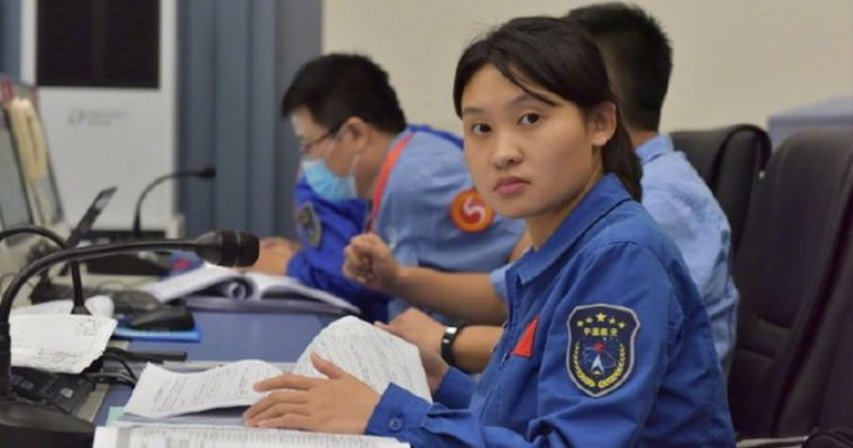The woman behind China's Chang'e-5 Moon mission
- 3 years ago

A 24-year-old female space commander has become a viral sensation on Chinese social media for her work on the Chang'e-5 Moon exploration programme.
Despite being the youngest commander at the Wenchang Spacecraft Launch Site, Zhou Chengyu is known at work as "Big Sister" as a sign of respect.
The Chang'e-5 mission is China's third successful Moon landing in seven years.
Ms Zhou was in charge of the rocket connector system - described as a pivotal role.

Ms Zhou has been described in state media as a "big sister" that young Chinese can look up to
The young astronaut has been a trending topic on Weibo since Chinese state media highlighted her as one of the women involved in the successful launch of the Chang'e-5 lunar probe on 23 November.
Her story in particular has resonated with the public given her young age. Social media users have been celebrating her "brilliance" and referring to her as a "source of pride" for the country.
Zhou Chengyu, the 24-year-ond lady of Tujia ethnic group, took the mission as the commander of the rocket connector system in Chang'e-5 launching. pic.twitter.com/iHwpYn6CWr
— Hua Chunying 华春莹 (@SpokespersonCHN) November 28, 2020
Several people jokingly reflected on their own achievements, commenting how far behind in life they were in comparison.
The huge amount of interest in the Guizhou Province native has not appeared to have had much of an effect on her, however. According to news site Duocai Guizhou Net, Ms Zhou declined repeated requests for interviews as she does not wish to let fame get in the way of her work.
The aim of the Chang'e-5 - named after the Chinese moon goddess - is to gather lunar rocks and soil to help scientists learn more about the moon's formations.

Chang'e-5 landed in the northwest of the Moon's nearside, planting the Chinese flag there as seen on the right
If successful, it would be the first in more than 40 years to bring lunar samples back to Earth, and will make China the third country to do so after the United States and the Soviet Union.
The mission is part of Beijing's push to become a space superpower, with the Chinese state media casting the "space dream" - as President Xi Jinping calls it - as one step in the path to "national rejuvenation".
For China, space exploration is seen as a way to display its growing technological might, as well as to demonstrate itself as a force to be reckoned with on the world stage.
Prof Ouyang Ziyuan, one of the country's top scientists, told China's official newspaper People's Daily back in 2006: "Lunar exploration is a reflection of a country's comprehensive national power."
Last year, China became the first country to successfully land a robotic spacecraft on the far side of the moon. In the next few decades, it plans to build a research station on the Moon and send people to Mars.
Most Chinese know the story of the mythological Chang'e, the Chinese goddess of the moon. It's a story not dissimilar to Romeo & Juliet - about a woman who drinks an immortality potion, accidentally leaving none for her husband, and weightlessly, flying to the moon so she can stay close to him until he dies.
It is told every year during China's Mid-Autumn/Moon Festival, and so people can't hear the word "Chang'e" without conjuring up romantic images of a moon goddess.

Pictures of 24-year-old Zhou Chengyu have been all over state media in China
For this reason, China's mission to the moon was calling out for a strong female figure. And so pictures of 24-year-old Zhou Chengyu have been all over state media, with comments about how she is a "frontline soldier in the field of aerospace" and a "big sister" that young Chinese can look up to.
China has been increasingly trying to highlight strong female figures in the country. The country's top leadership is extremely male-dominated, but in November, national newspaper Global Times invited netizens to comment on the year's achievements by women like medical scientist Chen Wei, foreign ministry spokeswoman Hua Chunying, and UFC fighter Zhang Weili.
But many in China feel that the role of women in the country is still underplayed, in many industries. This was a big talking point in September, when a TV drama highlighting women's roles in China's Covid-19 fight was widely viewed as sexist.
Comments